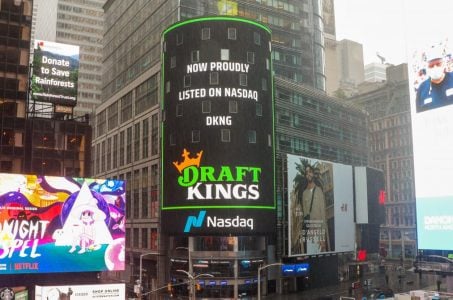Super Group SPAC Facing Shareholder Lawsuit
Posted on: May 22, 2023, 05:17h.
Last updated on: May 25, 2023, 05:58h.
An investor is suing the founders of the special purpose acquisition company (SPAC) that merged with sportsbook operator Super Group (NYSE: SGHC). He alleges the executives enriched themselves while setting ordinary shareholders up for failure.

In a complaint filed last week in the Delaware Court of Chancery, counsel for plaintiff Dylan Newman — a Super Group investor — argued that Sports Entertainment Acquisition Corp. (SEAC) founders John Collins, Chris Shumway, and Eric Grubman structured the blank-check company in such a way that they could benefit from a bad deal while outside investors would be left holding the bag.
SEAC was incorporated in July 2020 and went public later that year. In April 2021, the blank-check firm announced plans to merge with Betway parent Super Group in a deal placing a pre-equity valuation of $4.75 billion on the gaming company.
That transaction paved the way for Super Group to become a publicly traded company in late January 2022. Since then, the stock has struggled mightily.
The all-time high for the shares in either SPAC or standalone form is $12.48, notched before the deal being finalized. The record high for Super Group shares was over $11, reached in April 2022, but the stock settled at just $3.65.
Inside Plaintiff’s Claims Against Super Group SPAC
Before the SEAC’s initial public offering, the aforementioned defendants received 11.25 million shares of common equity at a cost of just $25,000, or mere 0.0023 cents a share, according to the legal filing. In conjunction with the SPAC’s IPO, the defendants and another unidentified investor sold the 11 million warrants at $1 apiece.
They waived redemption rights for the founder’s shares, meaning it was essential for the SPAC to find a merger partner, because absent a deal, those shares would have expired worthless, noted counsel for the plaintiffs.
As a result, Defendants knew that any deal even a bad one that caused SEAC’s stock price to drop below the $10 per share IPO price was much better for them than no deal because it would still provide them with a windfall,” according to the filing. “They also knew that by limiting the number of redemptions, which deplete cash from the Trust, Defendants could maximize the Trust funds used to consummate a merger and ensure that Defendants would receive value for their Founder Shares.”
Typically, SPACs have two years following an IPO to find a merger partner. If that doesn’t happen, the shell company liquidates, returning cash to shareholders and likely leaving founders without substantial profits. In other words, most SPAC founders are highly motivated to bring deals across the finish line.
“These incentives drove Defendants to encourage public Class A stockholders not to exercise their redemption rights and to vote in favor of a merger regardless of its merits,” noted counsel for the plaintiffs in the SEAC case. “Notably, Class A stockholders could vote ‘for’ a potential transaction and nonetheless redeem their shares, decoupling their voting interests in a potential transaction from their economic interests.”
SEAC Cash Considerations Allegedly Overstated
Compounding the potential vulnerabilities of external Super Group investors is the counsel’s assertion that the SEAC founders allowed a proxy statement to be published. That supposedly overstated the value of the blank-check company’s shares.
The statement indicated the value of those shares was $10 apiece, but due to dilution and cash declines, the actual value was closer to $6.72, according to the plaintiffs’ legal team.
“Moreover, Defendants knew there were likely to be substantial redemptions, as was becoming increasingly common in SPAC business combinations at this time. These redemptions would significantly reduce the per share cash contribution,” as noted in the filing.
The claim about rapid redemptions across the blank-check universe in 2021 has some merit because a slew of gaming companies that went public that year via SPAC mergers have seen their share prices slammed in the subsequent two years.
Counsel for the plaintiffs in the SEAC case argues the court should award damages “reflecting the difference between the value Class A stockholders would have received had they redeemed their shares prior to the Merger, and the true value of the shares they actually received in the Merger.”
Related News Articles
Fox CEO Lachlan Murdoch Sees ‘Clarity’ Coming in FanDuel Arbitration
New York Court Rules in Favor of FanDuel in $1B Founders Suit
DraftKings Gaining OSB Market Share, According to Stifel
DraftKings Stock Flashing Possible Buy Signal
Most Popular
FTC: Casino Resort Fees Must Be Included in Upfront Hotel Rates
Genovese Capo Sentenced for Illegal Gambling on Long Island
NBA Referees Expose Sports Betting Abuse Following Steve Kerr Meltdown
UPDATE: Former Resorts World & MGM Grand Prez Loses Gaming License
Most Commented
-
UPDATE: Whiskey Pete’s Casino Near Las Vegas Closes
— December 20, 2024 — 30 Comments -
Caesars Virginia in Danville Now Accepting Hotel Room Reservations
— November 27, 2024 — 9 Comments -
UPDATE: Former Resorts World & MGM Grand Prez Loses Gaming License
— December 19, 2024 — 8 Comments -
FTC: Casino Resort Fees Must Be Included in Upfront Hotel Rates
— December 17, 2024 — 7 Comments
















No comments yet